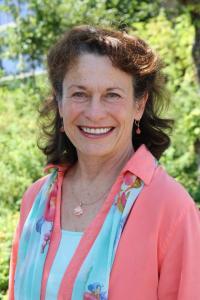MFA in Acting from the University of Southern California; PhD in Theatre History and Criticism from the University of Washington.
Courses
Basic and Advanced Acting, Embodiment, Environmental Theatre, Postcolonial Theatre/theory, Ecodrama/ecocriticsm, Native theatre, Latino/a drama.
Pedagogical approach
I am a follower of Paulo Freire’s educational model in which we are all collaborative learners at every step; in the acting studio this means listening to our emotional intelligence and embodied knowledge; in the seminar room, it means sharing knowledge and lived experience to decolonize our minds.
Accomplishments/Awards
Co-founder, exec director of Earth Matters on Stage (EMOS) ecodrama playwrights festival.
2014 Faculty Project Award CSWS for Women and Rivers Project; KCACTF Semi-Finalist David Mark Cohen Award for Salmon Is Everything; 2011 Oregon Humanities Center Grant for Salmon Is Everything; 2009 College of Arts and Sciences Special Project Grant for EMOS.
Fun Facts: Theresa was part of Grotowski’s Mountain Project in 1978; she worked as a clown after college, co-wrote the first book on sustainable theatre, and ran two site-specific theatre companies, one in LA and one in Seattle.
On April 23, 2021, associate professor of theater arts Theresa May will give a books-in-print talk, “Earth Matters on Stage: Ecology, Environment and American Theater.” Her book tells the story of how American theater has shaped popular understanding of the environment throughout the 20th century and its potential power in the age of climate change.
To register for the virtual talk go here: OHC Registration
Publication highlights
Books
Salmon Is Everything: Community-Based Theatre in the Klamath Watershed. Oregon State University Press, 2nd edition 2019. http://osupress.oregonstate.edu/book/salmon-is-everything
Readings in Ecology and Performance, co-edited with Wendy Arons. New York: Palgrave McMillan, 2012 (paperback 2015). 256p.
Greening Up Our Houses: A Guide to an Ecologically Sound Theatre (with Larry Fried). New York: Drama Book Pub. , 1994. 132 p.
Current book project: Ecodramaturgy: Greening American Theatre.
Articles
“Meditations on the Pain of Others: Theatre Squad’s Site-specific Protests.” Theatre Topics (March 2012): 23-37.
“Kneading Marie Clements’ Burning Vision.” Canadian Theatre Review 144 (Fall 2010): 5-12.
“Beyond Bambi: Toward a Dangerous Ecocriticism.” Theatre Topics 17:2 (2007):95-110.
“’Consequences unforeseen . . .’ in Raisin in the Sun and Caroline, or Change.” Journal of Dramatic Theory and Criticism XX:2 (2006): 127-144.
“Greening the Theatre: Taking Ecocriticism from Page to Stage.” Journal of Interdisciplinary Studies7(1) (Fall 2005): 84-103.
“The Ecology of Willy Loman.” New England Theatre Journal 14 (2004):63-76.
“(Re)Placing Lillian Hellman.” Journal of American Drama and Theatre 11:2 (1999):17-41.
“Frontiers: Environmental History, Ecocriticism and The Kentucky Cycle.” Journal of Dramatic Theory and Criticism XIV:1 (Fall 1999):159-178.
“Bahktin on Site: Chronotopes in Theatre in the Wild’s Dragon Island.” On-Stage Studies (1999) 22:19-38.
“Taking the Cage Out of the Gaze: Perception, Wilderness and the New Zoo.” Theatre Insight (1999) 10(2).
Chapters
“Ecodramaturgy and/of Contemporary Women Playwrights” with Wendy Arons in Contemporary Women Playwrights, Lesley Ferris and Penny Farfan, (eds.) (New York: Palgrave MacMillian, 2013): 181-196.
“Indigenous Theatre in Global Times: Situated Knowledge and Ecological Communities in Salmon Is Everything and Burning Vision,” in The World a Stage: Performance in Behalf of the Environment.” Richard Besel, Jnan Blau, (eds.). (New York: Rowen and Littlefield Publishing Group, 2013): Ch. 8. 18p.
“Toward Communicative Democracy: Developing Salmon Is Everything.” Community Performance: A Reader, Petra Kuppers and Gwen Robertson, (eds.). (London: Routledge, 2007): 153-154.
“Remembering the Mountain: Grotowski’s Deep Ecology.” Performing Nature: Explorations in Ecology and the Arts, Gabriella Giannachi and Stewart Nigel (eds.), Bern, (Switzerland: Peter Lang, 2005): 345-359.
Interviews
Oregon Humanities Center: UO Today, hosted by Paul Peppis. 2011
Gordon Bettles, steward of the UO’s Many Nations Longhouse and member of the Klamath tribe, appears with Theresa May, Theatre Arts and codeveloper of the play “Salmon is Everything.” They talk about the importance of salmon to Native culture and the devastating fish kill on the Klamath River in 2002. The play, staged by the UO’sUniversity Theatre May 20-June 4, addresses the cultural and spiritual dimensions of Klamath River water rights.

